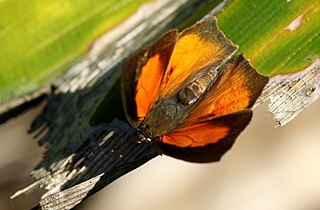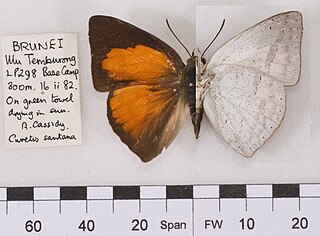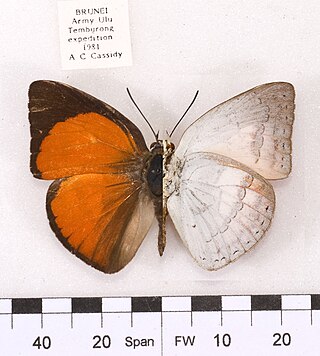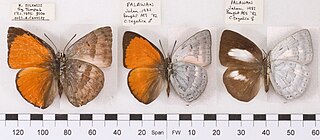
Lycaenidae is the second-largest family of butterflies, with over 6,000 species worldwide, whose members are also called gossamer-winged butterflies. They constitute about 30% of the known butterfly species.

Mud-puddling, or simply puddling, is a behaviour most conspicuous in butterflies, but also occuring in other animal, primarily insects. The organism seeks out nutrients in certain moist substances such as rotting plant matter, mud and carrion, and suck up the fluid. Where the conditions are suitable, conspicuous insects such as butterflies commonly form aggregations on wet soil, dung or carrion. From the fluids they obtain salts and amino acids that play various roles in their physiology, ethology and ecology. This behaviour also has been seen in some other insects like the leafhoppers, e.g. the potato leafhopper, Empoasca fabae.

Pantoporia sandaka, the extra lascar, is a species of nymphalid butterfly found in tropical and subtropical Asia.

Curetis siva, the Shiva sunbeam, is a species of lycaenid or blue butterfly found in Asia.

Curetis saronis, the Burmese sunbeam or Saronis sunbeam, is a species of butterfly belong to the lycaenid family. It is found in Asia.

Curetis acuta, the angled sunbeam, is a species of butterfly belong to the lycaenid family. It is found in Indomalayan realm. Curetis acuta is sexually dimorphic, the sexes differing in dorsal coloration of the wings, however their ventral wings are similar and of silver color which reflects sunlight. The reflection of light by silver ventral wings plays a role of signalling during flight, camouflage while at rest or during hibernation, and lowering body temperatures by reflecting the sunlight.

Curetis, the sunbeams, is a genus of gossamer-winged butterflies (Lycaenidae) from Southeast Asia. They are presently the only genus in the subfamily Curetinae.

Euthalia monina, the powdered baron or Malay baron, is a species of nymphalid butterfly. The species was first described by Frederic Moore in 1859.

Curetis santana is a species of butterfly belonging to the family Lycaenidae. It was described by Frederic Moore in 1857. It is found in Southeast Asia.

Curetis regula is a species of butterfly belonging to the lycaenid family. It was described by Evans in 1954. It is found in Southeast Asia.

Curetis sperthis is a species of butterfly belonging to the lycaenid family. It is found in Southeast Asia.

Curetis tagalica, the Southern Sunbeam, is a species of butterfly belonging to the lycaenid family. It is found in Southeast Asia.

Artipe eryx, the green flash, is a species of butterfly belonging to the lycaenid family described by Carl Linnaeus in 1771. It is found in the Indomalayan realm.

Curetis barsine is a species of butterfly belonging to the lycaenid family. It is found in the Australasian realm.
Curetis venata is a species of butterfly in the lycaenid subfamily Curetinae. It was described by Hans Fruhstorfer in 1908 as subspecies of Curetis insularis. Its type locality is on Sulawesi, Indonesia. Subspecies Curetis venata saleyerensis is known from Selayar Island.

Curetis brunnea is a species of butterfly in the lycaenid subfamily Curetinae. It was described by Alfred Ernest Wileman in 1909 as Curetis acuta var. brunnea.

Curetis insularis is a species of butterfly belonging to the lycaenid family. It is found in the Indomalayan realm. Curetis insularis was described by Horsfield in 1829.
















